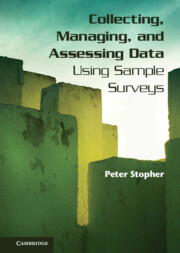Book contents
- Frontmatter
- Contents
- Figures
- Tables
- Acknowledgements
- 1 Introduction
- 2 Basic statistics and probability
- 3 Basic issues in surveys
- 4 Ethics of surveys of human populations
- 5 Designing a survey
- 6 Methods for conducting surveys of human populations
- 7 Focus groups
- 8 Design of survey instruments
- 9 Design of questions and question wording
- 10 Special issues for qualitative and preference surveys
- 11 Design of data collection procedures
- 12 Pilot surveys and pretests
- 13 Sample design and sampling
- 14 Repetitive surveys
- 15 Survey economics
- 16 Survey implementation
- 17 Web-based surveys
- 18 Coding and data entry
- 19 Data expansion and weighting
- 20 Nonresponse
- 21 Measuring data quality
- 22 Future directions in survey procedures
- 23 Documenting and archiving
- References
- Index
2 - Basic statistics and probability
Published online by Cambridge University Press: 05 June 2012
- Frontmatter
- Contents
- Figures
- Tables
- Acknowledgements
- 1 Introduction
- 2 Basic statistics and probability
- 3 Basic issues in surveys
- 4 Ethics of surveys of human populations
- 5 Designing a survey
- 6 Methods for conducting surveys of human populations
- 7 Focus groups
- 8 Design of survey instruments
- 9 Design of questions and question wording
- 10 Special issues for qualitative and preference surveys
- 11 Design of data collection procedures
- 12 Pilot surveys and pretests
- 13 Sample design and sampling
- 14 Repetitive surveys
- 15 Survey economics
- 16 Survey implementation
- 17 Web-based surveys
- 18 Coding and data entry
- 19 Data expansion and weighting
- 20 Nonresponse
- 21 Measuring data quality
- 22 Future directions in survey procedures
- 23 Documenting and archiving
- References
- Index
Summary
Some definitions in statistics
Statistics is defined by the Oxford Dictionary of English Etymology as ‘the political science concerned with the facts of a state or community’, and the word is derived from the German statistisch. The beginning of modern statistics was in the sixteenth century, when large amounts of data began to be collected on the populations of countries in Europe, and the task was to make sense of these vast amounts of data. As statistics has evolved from this beginning, it has become a science concerned with handling large quantities of data, but also with using much smaller amounts of data in an effort to represent entire populations, when the task of handling data on the entire population is too large or expensive. The science of statistics is concerned with providing inputs to political decision making, to the testing of hypotheses (understanding what would happen if …), drawing inferences from limited data, and, considering the data limitations, doing all these things under conditions of uncertainty.
A word used commonly in statistics and surveys is population. The population is defined as the entire collection of elements of concern in a given situation. It is also sometimes referred to as a universe. Thus, if the elements of concern are pre-school children in a state, then the population is all the pre-school children in the state at the time of the study. If the elements of concern are elephants in Africa, then the population consists of all the elephants currently in Africa. If the elements of concern are the vehicles using a particular freeway on a specified day, then the population is all the vehicles that use that particular freeway on that specific day.
- Type
- Chapter
- Information
- Publisher: Cambridge University PressPrint publication year: 2012



